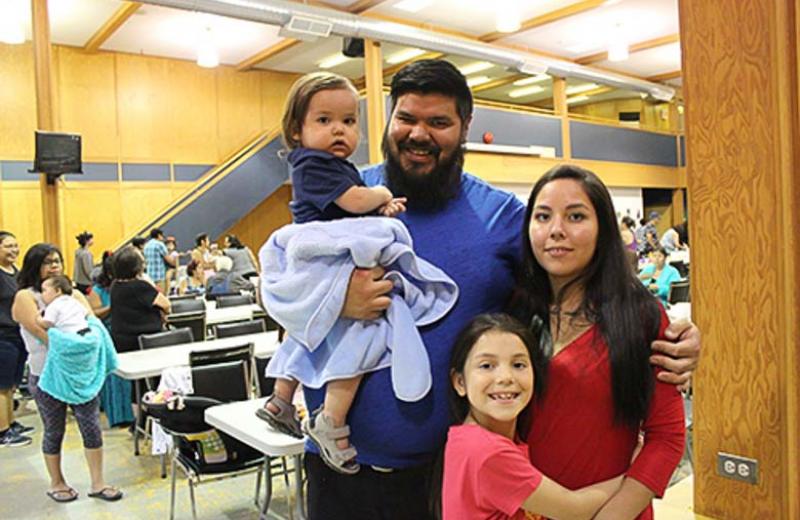When Liza Haldane, LELP Coordinator, applied for an IMAGINE grant on behalf of the Lisims Early Learning Partnership, she wanted to honour the early learning table's goals of celebrating their pre- and postnatal families by hosting an event that also raised awareness of the gaps in services for vulnerable members of the Nisga'a Nation: Lax̱galts'ap, Gingolx, Gitlax̱t'aamiks and Gitwinksihlkw (Northwest of Terrace). For a goal like this to be achieved, she recognized that including the traditional and cultural values of the Nisga’a region would be very important. The relationships between generations and families would also have to be considered in the planning process and the event would have to carefully balance different traditions alongside the needed pre- and postnatal services. With all that in mind, project “Agwiiyeet'inim̓ ahl g̱ahlgim̓ - We pass it on to our children” was born!
The goals of the project and event included:
- Honour the families who are expecting or who have newborn infants, and celebrate newborns in a traditional ceremony.
- Raise community awareness of the importance of supporting families who are expecting and who have newborn infants.
- Work together and practice Nisga’a law of Sayt-k’ilim-goot (one heart; to be united) by sharing services and resources for the betterment of Nisga’a families.
- Register families for existing programs and services.
How it happened:
Part of raising community awareness for supporting new or expecting families was done by welcoming entire families and the community to the event. This meant, during the event, families were circled and a prayer was said, making a commitment to support these families in raising their children.
At the event, prenatal families were invited to the front of the hall, honoured with a poem, and given a canvas painting to acknowledge their commitment to bringing a baby into this world. Families with newborns had the opportunity to have their questions answered, via a customized questionnaire that was provided. The babies were welcomed into their community with a beautiful house crest blanket, adorned upon them by their Wilp family members (members of Wilp are all descendants of a common female ancestor). The total number of babies: 23 altogether!
In order to share existing resources and programs, LELP partners, including early learning centers, public health nurses, community health representatives, Success By Six, and village governments, worked together and were united in delivering the ceremonies. Having partners experience and share equal time in the ceremonies helped balance tradition and incorporate wellness. After the ceremony, registration forms were made available and parents registered their children for the Imagination Library (books to kids program). Service providers spoke during the post-ceremony meal, promoting Dax̱gadim Anluuhlkw (translates to Strong Nest, which is a delivery and development strong start program), Welcome Baby Bags, and other relevant services.
“These events were so emotional. To see two to three generations of families proudly welcoming their babies into the community evoked emotions of happiness, pride, and so much love! At the end, we encircled the families in a community prayer, holding them up with words of strength and encouragement - it was very spiritual and moving.
A Chief got up and spoke at the end of the Laxgalt'sap/Gingolx event - he was full of gratitude and blessings for the ceremony. He said after tonight, he was once again filled with hope for our community, our culture and traditions. It brought many of us to tears.”
- Liza Haldane
What’s next?
As a result of this successful event and the sparked interest in traditional child rearing, organizers delivered a "Yask" workshop (rights of passage) for pre- and postnatal families and are working together to deliver another set of welcome baby ceremonies. These workshops will eventually rotate into smaller communities. The plan is to deliver ceremonies annually!
What is a Northern Health IMAGINE grant?
IMAGINE Community Grants provide funding to community organizations, service agencies, First Nations bands and organizations, schools, municipalities, regional districts, not-for-profits, and other partners with projects that make Northern communities healthier. We look for applicants that will support our efforts to prevent chronic disease and injury, and improve overall well-being in our communities.














Comments